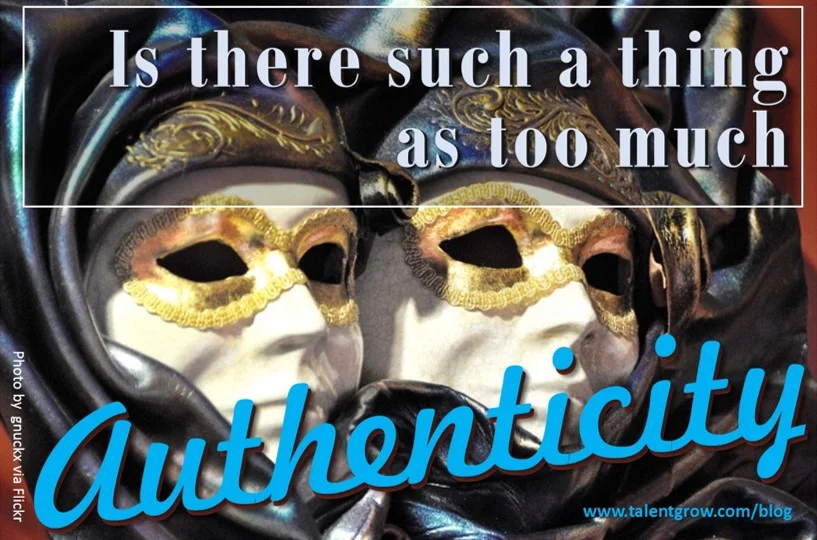Is there such a thing as too much authenticity?
/What does authenticity mean to you?
To me, it means being real, being the opposite of fake or pretentious.
It means being honest and open. It means being willing to be vulnerable and imperfect.
These are values that align with mine, which is why the construct of authenticity appeals to me. But a recent HBR article has brought new questions to mind that are shaking this idea up. Let's delve deeper and see what you think - is there maybe such a thing as too much authenticity?
Business *IS* personal
Many people seem to like the concept, also, which is why it’s getting a lot of press and airtime. I think that business people in the 21st century are more ready than they’ve ever been before to recognize that people are complex, emotional AND rational, beings. That they come to work with their whole body, their whole brain, their whole self. And that we need to deal with them as whole beings, warts and all.
While perhaps in the past we could talk about ‘it’s not personal, it’s business’ or separating our personal and work identifies, we are all increasingly aware that it’s not only not really possible, it’s probably a bad idea in the first place. And while we used to struggle to make this happen to keep up with those unrealistic business expectations, we now struggle to undo the damage done by those unrealistic expectations and to realign our expectations to the truth.
Transparency in a hyper-connected world: a path to a greater need for authenticity
I've written about this idea previously, grappling with the need to merge identities and become more transparent in this new world order of high transparency and reduced boundaries. As I've suggested, in a highly networked world we can no longer hide behind veneers or persist upholding multiple identities. Privacy and anonymity are relics of history, never to return.
So we have no choice but to fully embrace the only identity we can sustain consistently: our true self.
Leaders must add trust and vulnerability to the equation
This reality means that leaders have to recognize that they cannot hide in their offices. It means they shouldn't pretend that they have all the answers when communicating with others, be they team-members, peers, colleagues or senior leaders. They have to be honest, real, transparent, and vulnerable... in other words, authentic. That's why I coach leaders to create more trust by adding vulnerability into the equation.
But wait, there might be a problem with too much authenticity...
A fascinating recent article in the Harvard Business Review entitled "The Authenticity Paradox" (I highly recommend you read it) challenges the usefulness of the advice to be more authentic. In essence, the author, Herminia Ibarra, claims that in order to grow, we all have to go outside our comfort zone and take on behaviors and skills that feel very foreign and unnatural to us. She suggests that by talking up authenticity so much, we are giving many leaders the 'go ahead' to stay comfortably within their current skill-sets and habits because that's what feels 'real' and 'natural' -- they feel more "true-to-self".
Ibarra asserts that only by 'faking it' with new habits or behaviors that we want to grow into can we truly develop ourselves as leaders. She says that we have to act before we can become. In this way, we must be inauthentic first, and then eventually the new behaviors will become part of who we are. She warns that too much focus on authenticity not only promotes leader complacency, it also causes people to make excuses for unhelpful or even destructive behaviors - they can just fall back on "that's just how/who I am" and have no incentive to change.
...or is there?
When I read that, I was very intrigued. It really got me thinking about whether I'm doing more harm than good for talking up authenticity so much.
Could there be too much of a good thing with authenticity?
Can we say that you should be authentic only to a certain degree but be willing to put on airs in the service of growth and development?
Or is she just confusing the construct with another, similar one?
Ok, so now what?
While I am still open to discussing this and thinking about this interesting dilemma further, my sense is that it's not an 'either-or', but rather a 'both-and' situation. Thinking about it in binary terms is not helpful.
I think that there is a range of behaviors that are still authentic but adaptive and dynamic to allow for learning and change.
I agree that there is a certain amount of 'acting out of character' that is necessary when we consciously practice new behaviors that are not native or natural to us before we develop an unconscious competence with them . But somehow it seems to me that this is a separate kind of 'fake' from the one where people pretend they are someone else or put on a veneer that is not true to their core nature, their core values, their authentic self.
I'd love to know where you stand on this. What do you think? Chime in below in the comments.
Sign up to my free weekly newsletter and get more actionable tips and ideas for making yourself a better leader and a more effective communicator! It’s very short and relevant with quick tips, links, and news about leadership, communication, and self-development. Sign up now!
Also, subscribe to my podcast, The TalentGrow Show, on iTunes to always be the first in the know about new episodes of The TalentGrow Show! http://apple.co/1NiWyZo
You Might Also Like These Posts:
'Be yourself' or 'Fake it till you make it'? How to straddle the leadership advice debate
Transparency in a networked world: Merging personas and removing veneers
Ep036 Fierce Leadership, Radical Transparency, and Deeper Human Connectivity with Susan Scott


